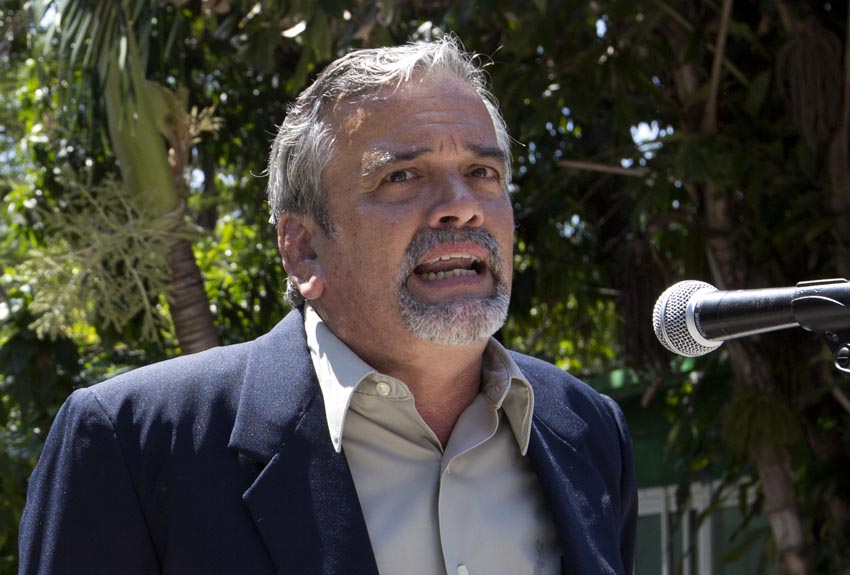Joseba Etxarri. Basques in Cuba can boast about having one of the oldest Basque clubs in the world. It was officially founded in 1877 and called the Basque-Navarre Charities Association (AVNB) in Havana, an institution that keeps striving for, “knowledge, dissemination and the revitalization of the Basque culture in Cuba,” as the Charitable Society of citizens and descendants of the Basque-Navarre Provinces of Matanzas (1868) did before, followed by the Centro Euskaro (1908) and the Havana Basque club (1911), entities that have disappeared today. Since 2012, Renato Garcia Egusquiza is president of the Basque club.
You are Cuban and since Basque emigration to Cuba was not large, how does this Basque feeling endure under such unfavorable circumstances?
-Through family and the Basque club. My great-grandfather, Felipe Egusquiza Ugarte, came to Cuba at the end of 1800 from Bizkaia, following the steps of his uncle, Jose Leon Egusquiza Aldecoa. Felipe married in Cuba with a woman from the Canary Islands, and his son was my maternal grandfather, Raul Felipe Egusquiza Rodriguez. He told me about our roots and the Basque customs and taught me to count to 10 in Euskera. He used to say that his dad, when he came to Cuba, didn’t know any Spanish and initially he just gathered with Basques. In the town of Aguacate he founded, along with some other Basque, the Bilbao family, a large cellar, Bilbao and Cia, where during times of war against the Spaniard regime, he told me they used to hide Cuban rebels and would feed them. Basque spirit was always predominant in our house, there was always an ikurriña and I fondly remember how my grandfather would take me to Basque club events in Havana.
What image did they give you of the Basque Country?
-That of a very proud land with its own History, culture, customs, sports, not better or worse than others, but with the desire to continue this legacy for many generations as they had done for centuries. Several members of my family, including my mother, were Basque club members from a very young age.
You were elected club president in 2012 at a crossroads moment for the club.
-Those were times where we ran the risk of disappearing. We had about 200 members, the most of which were older, with barely any activities and no youth or children participation. We reorganized the association, and decided to open the door to anybody interested in the Basque culture, including Basques, Basque descendants, and friends of the Basques, organizing activities to attract everyone, especially, but not only, young people. We changed our communication strategy, we organized conferences, showed documentaries, gave classes of Basque and put together many different activities related to the Basque culture, all of those open to the general public, because we believe that it is important to share and let know people in Cuba about who we are. The inter-cultural aspect is fundamental since Basque has fused, and added to, contributing to the general development of this country.
What kind of shape is the club in now?
-Right now we have 526 members and of them 32 were born in the Basque Country, 178 are registrered to vote in some Basque province. We have a soccer team, the VascoNavarra FC, that will probably soon be renamed, Euskaria, recuperating the name of the Basque historic team that won a championship in Cuba. Since last year we have been teaching Basque with the support of HABE, we teach dance, we organize and participate in the organization of conferences and screenings, we hosted the Euskal Herria Mugaz Gaindi Seminar, and we pay special attention to the elderly and dependents…. In the last year, some of our get-togethers have included the Tamborrada, San Fermin, and the club’s anniversary; we celebrate the Virgin of Begoña (she is since 1883 'patrona' of the club) and the International Day of the Emigrant...
This week you will hold a Basque Week in Havana.
-We decided to celebrate Aberri Eguna with an entire week of activities, under the name of Habanako Euskal Astea (Havana Basque Week). It began on Monday with an Euskera meeting and throughout the week we have programed a friendly soccer tournament, a conference on Euskera, showings of documentaries on the Basque Country, a mus tournament and on Sunday, together with the celebrations in the Basque Country and Basque clubs worlwide, Aberri Eguna (Day of the Basque Homeland). We´ll start Sunday with a Korrika, followed by music, bertsolaris, Cuban singer Ray Fernandez and a all day long celebration. We expect 250 people to attend the Aberri Eguna lunch. For us it's is a big celebration of the homeland, to affirm and assert the Basque people.
You have never been to the Basque Country.
-Never. I look forward to go in October for the World Congress of Basque Collectivities in Vitoria-Gasteiz, where I will participate as a delegate from Cuba.
How do you imagine it?
-I don’t imagine the Basque land, I feel it.






 Send to a friend
Send to a friend Add comment
Add comment








